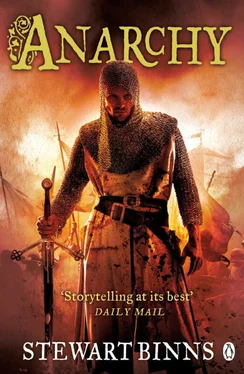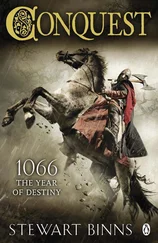Although I was intrigued throughout my childhood by the inexorable rise of the mighty walls of the cathedral, and despite being in awe of the skills of its masons, carpenters and churchwrights, my yearnings soon turned to more martial pursuits, especially when I began to approach adulthood. I dreamed of emulating the deeds of my father and grandfather, both of whose exploits were well known – especially those of Hereward, who was by then a legendary figure, spoken about with hushed reverence.
No one in Norwich knew that we were related to Hereward and Sweyn; my mother preferred her anonymity, especially as she worked so closely with master masons and senior clerics, all of whom were Normans. Although the pain of the Conquest was becoming a thing of the past, resentment was never far beneath the surface within the English community and we had to be careful lest our lineage antagonize our Norman masters, or become a rallying call for our English friends. Still, my heritage resonated strongly in my heart.
I first made contact with young Englishmen who were determined to keep alive the dream of liberty from Norman rule through some of the masons working on the cathedral. Although the senior masons were Normans, most of the junior ones were English. They were intelligent and articulate, but were denied further progress because of rigid Norman control of the masons’ hierarchy. This caused bitter resentment. Several of them would meet in Lion Wood on Sundays. Their women and sisters would prepare food, and they would share stories of the English resistance from the past, air their grievances and talk about how England could plot a way to freedom.
They were initially wary of me because my mother was one of the few prominent English people in Norwich and thus open to accusations of collaboration with the Normans. However, her deeds in the Holy Land with the English contingent nullified any suspicion and thus I was allowed to join the Sabbath gatherings. Sometimes I wished I could reveal my family history and so gain favour with them, but it would have put at risk my mother’s relationship with the Normans, so I chose discretion.
Some of the men kept weapons in the wood and practised with them. They taught me many things about fighting, especially at close quarters, and how to survive in the wilderness – all of which was a useful supplement to my formal training to become a knight with Hugh Bigod, the Earl of Norwich.
My Sabbaths in Lion Wood continued blissfully for many weeks. My fellow renegades were older than I was – I had just turned fifteen – and keeping their company led me to pretend that I was older than my tender years. There were the thrills of clandestine rendezvous to be savoured and mock fights to be enjoyed. I learned that there was still a secret network of similar young men and women throughout the land, many of whom were descendants of those who fought the Normans on Senlac Ridge, or were part of my grandfather’s resistance movement and the Brotherhood of Ely.
As time passed I was shocked to hear countless stories of brutality and oppression from Norman lords towards the English. Many Normans believed in firm rule, but acted with decency. Indeed, in Norwich we were fortunate that both the Earl and the Bishop were fair in their treatment of the local people. However, in many parts of the country, especially in the more remote areas and the border regions, Norman lords did just as they pleased, regardless of the law and even of human decency.
Their crimes went unrecorded: people disappeared, never to be seen again, and every imaginable cruelty was meted out to the local people, none of whom had any means to defend themselves. Retreat into the wildwood, or escape to the uplands and fenlands, was often the only recourse. Even then, they were ruthlessly hunted down, often for sport, their bodies brought back and displayed like hunting trophies. We were told that one particularly vicious lord in Northumbria kept a pack of wolves in a pit so that he could entertain his guests by throwing English captives into it after dinner. Another liked to disembowel anyone to whom he took a dislike.
In some places, huge tracts of land that had been sequestered by the new Norman lords from their old English landlords had been left to go wild and the villages that once were thriving homes lay derelict. Stories of tyranny and destitution were legion from every part of the country and strengthened our desire to find a way to resist – especially among the young, who knew that their English birthright meant they were unlikely ever to play a prominent role in the affairs of their own land.
I was the only member of the group without a female companion, but I tried to catch the eye of several of the unattached younger girls, sometimes with modest success. But then I could never be sure whether the smile or look returned was simply a gesture of kindness or the more enticing signal I hoped it would be.
Some of the older men began to make serious plans to disrupt the comfortable lives the Normans were leading: poaching livestock to give to the peasants, stealing from granaries to redistribute the spoils to the poor, and there was even talk of mounting raids on small garrisons and linking up with bands of outlaws we knew lived in the remote parts of the wildwood. Not having any real sense of what the risks would be, I was a vociferous advocate of such plans and, to the credit of my companions, was humoured with gracious smiles and only the occasional look of disdain.
However, in September of 1113, the real world suddenly exposed the pretence of our Sundays of sedition. It was late in the afternoon, all the food had been eaten and the usual animated debate about future schemes and plots, fuelled by plentiful flasks of ale, had subsided. The rabble-rousing had been replaced by slumber for most, but a few of the more spirited ones had found discrete spots in the greensward for a little frolicking.
The distinct neighing of horses was the first sign of danger. Hunting was forbidden in the forest and farm horses would not be working on the Sabbath, so horses – especially several of them – signalled impending menace. Then came the animated cries of men-at-arms and the rumbling of hooves. They were Norman cries, and they were coming from all directions. Everyone was soon on their feet and running in panic in different directions.
All I could hear was the impassioned cry, ‘ Run! ’
I ran as I had never run before. My heart raced; I seemed to have the speed and agility of a stallion and leapt over brushwood and fallen tree trunks as if they were not there. I saw only two Normans, as I passed between them, each several yards from me. The late summer undergrowth was high and helped conceal my dash for safety and, to my immense relief, the two soldiers did not see me. They did not see the young couple who had been romping in the long grass either, but I did – I bowled over the lad as he was pulling up his leggings. His all-but-naked partner was still on the ground, screaming in terror. With shrieks and shouts ringing in my ears behind me, my impetus hardly stalled, I continued my desperate sprint, not really slowing until I saw Norwich’s Eastgate ahead of me.
Then I stopped suddenly and dived for cover at the side of the road. The gate was barred by a patrol of mounted Normans, on guard, their distinctive conical helmets glinting in the setting sun. They had seen me, and three of them closed on me at a gallop. I ran again; my only chance was the deep forest, which would be too dense for the horses to pursue me at speed. But this time fatigue soon caught up with me and my lungs started to strain in panic and exhaustion. I stopped, in part to get my breath, but also to see if I could hear my pursuers.
I held my breath to confirm what I suspected, and heard the distinct sound of horses moving through the dense forest, the swish of their riders’ swords slicing through the foliage. They were close, too close for me to attempt to run; they would surely hear my movements. Then I heard the barking of dogs in the distance. A new beast was hunting me – one I could not outrun.
Читать дальше












